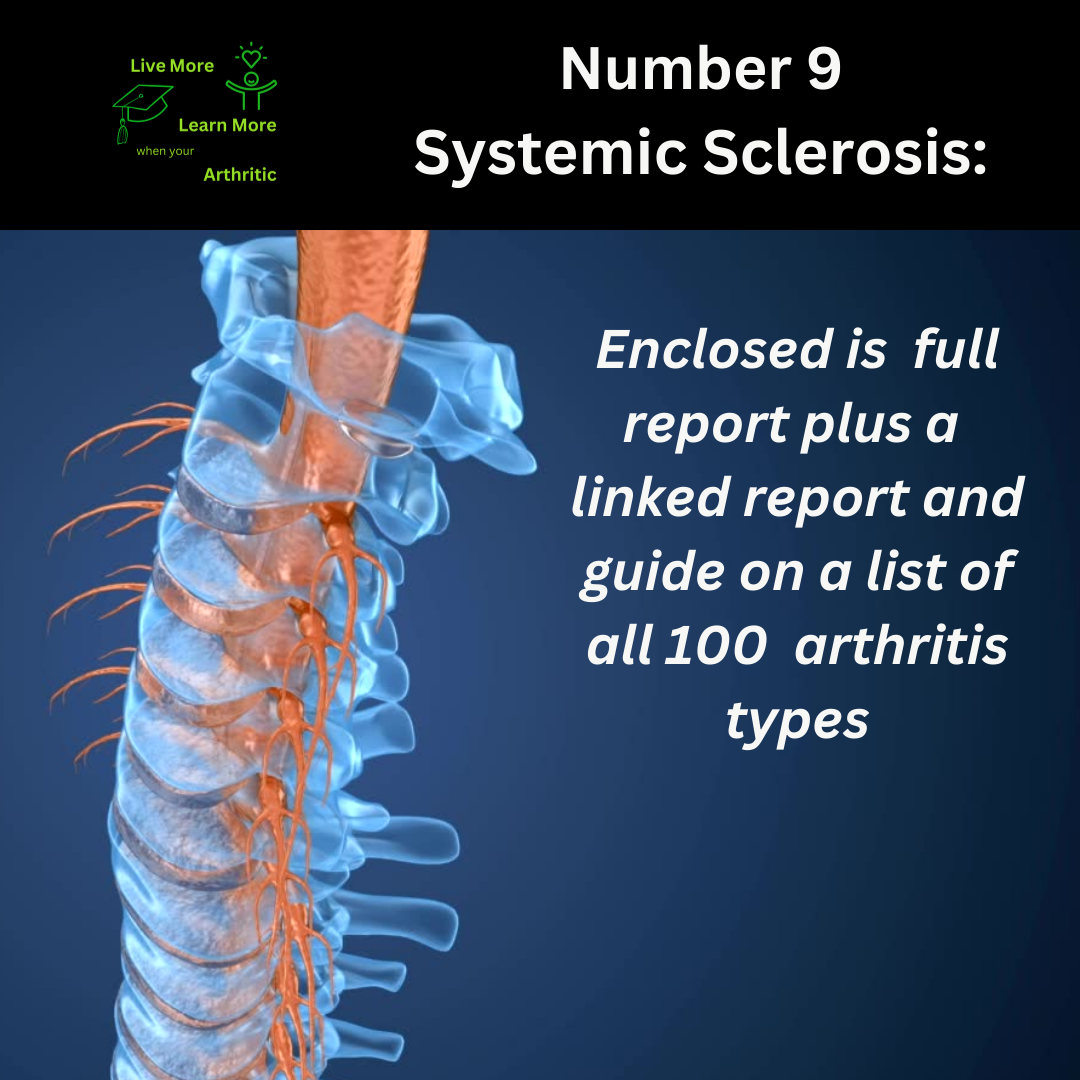
Systemic Sclerosis Number 9 on the list of 100 types of Arthritis
Embracing Life with Systemic Sclerosis: A Journey of Resilience
Imagine waking up one day, and your skin begins to feel tight and thick. Your joints become stiff, and simple tasks like opening a jar or buttoning a shirt suddenly become challenging. This is the reality for those living with Systemic Sclerosis, also known as Scleroderma—a rare autoimmune disease that affects the connective tissues of the body, causing a range of symptoms and challenges. But amidst the difficulties, there is hope, resilience, and the power of embracing life.
 Description of Systemic Sclerosis
Description of Systemic Sclerosis
Systemic Sclerosis is a chronic autoimmune condition characterized by the hardening and tightening of the skin and connective tissues. This condition falls under the umbrella of autoimmune diseases, where the immune system mistakenly attacks healthy tissues, leading to inflammation and fibrosis (or scarring) in various parts of the body. The hallmark symptom of Scleroderma is skin thickening, which can affect not only the skin but also internal organs such as the lungs, heart, kidneys, and digestive tract.
Causes and Triggers
The exact cause of Systemic Sclerosis remains unclear, but researchers believe it involves a combination of genetic predisposition and environmental triggers. Certain factors, such as viral infections, exposure to toxins, or hormonal imbalances, may play a role in initiating the autoimmune response that leads to Scleroderma.
Symptoms and Impact on Mobility
Aside from skin thickening, Systemic Sclerosis can cause a myriad of symptoms including joint pain, stiffness, and swelling, which can lead to limited range of motion and difficulty performing daily activities. In severe cases, the tightening of skin and tissues can affect vital organs, impacting overall health and mobility.
Age of Onset and Lifespan Impact
Systemic Sclerosis most commonly begins between the ages of 30 and 50, although it can occur at any age, including childhood. The impact on lifespan varies widely depending on the extent of organ involvement and complications. While Scleroderma can be a serious and life-altering condition, advancements in treatment and management strategies have improved outcomes and quality of life for many individuals.
Achieving a Higher Quality of Life
A proactive approach is key to managing Systemic Sclerosis and improving quality of life. Some strategies include:
- Physical Therapy: Regular exercise and stretching can improve joint flexibility and prevent muscle atrophy.
- Diet and Nutrition: A balanced diet rich in antioxidants and anti-inflammatory foods may help reduce symptoms and support overall health.
- Psychological Support: Coping with a chronic illness can be emotionally challenging. Seeking counseling or joining support groups can provide valuable emotional support.
Possible Complications
Systemic Sclerosis can lead to complications affecting various organs, including:
- Lung Involvement: Pulmonary fibrosis and pulmonary hypertension are common complications that can impair breathing and oxygenation.
- Heart Problems: Scleroderma can affect the heart muscles and blood vessels, leading to arrhythmias, heart failure, or pericarditis.
- Kidney Disease: Renal crisis, characterized by sudden onset high blood pressure and kidney failure, is a serious complication of Scleroderma.
 Holistic and Natural Approaches
Holistic and Natural Approaches
While there’s no cure for Systemic Sclerosis, some individuals find relief from symptoms through holistic approaches such as:
- Herbal Supplements: Certain herbs like turmeric and boswellia have anti-inflammatory properties that may provide symptomatic relief.
- Mind-Body Practices: Meditation, yoga, and deep breathing exercises can help manage stress and promote relaxation.
Prevalence and Gender Distribution
Systemic Sclerosis affects women more frequently than men, with a female-to-male ratio of approximately 4:1. While it can occur at any age, the peak onset is between 30 and 50 years old.
In conclusion, living with Systemic Sclerosis presents unique challenges, but with a proactive approach to management, individuals can lead fulfilling lives. By embracing medical treatments, adopting healthy lifestyle habits, and exploring holistic strategies, those with Scleroderma can navigate their journey with resilience and optimism. Each day becomes an opportunity to cherish life, connect with others, and find joy despite the challenges posed by this complex autoimmune condition.